The content of the article
The health of the Maine Coon is directly dependent on the quality of the products that make up their diet. Selecting the menu for the cat, you need to take into account the age and weight of the pet. Maine coons can be fed both with natural products prepared by the owners and with special balanced dry food.
Natural food
- Beef (veal). Kittens and adult cats can be given raw frozen meat. For kittens aged 4-8 months, the meat must be very finely chopped and confined to a daily serving of 50 grams, for cats over one year old - 100-120 grams.
- Chicken meat. Kittens under three months of low fat chicken breast should be boiled. Chicken legs can be included in the diet of kittens from four months of age.
- Chicken and beef offal. These include: liver, kidney, heart, lungs. These products are used for feeding Maine Coons, starting from the age of one and only in boiled form. Offal is absorbed by about 90% and extremely useful. In the wild, cats get most of the nutrients from the stomach of birds. Cooked chicken felines for felines should be thoroughly washed from stones.
- A fish. This product, despite the common stereotype, should not be given to cats at all.
- Chicken eggs. Eggs contain a large amount of easily digestible proteins, amino acids and vitamins (biotin is especially useful for cats - vitamin E). You can give only the yolk and better boiled. Kittens should not be lured by eggs before their digestive system gets used to meat and curd. For kittens, the yolk is mixed with low-fat cottage cheese and fed no more than 4 times a week. Adult cats are allowed to use this mixture 2 times a week. It is useful to give crushed egg shells 2-3 times a month to meet the body's need for calcium.Pre-shell must be treated with boiling water, or, best of all, give the shell of boiled eggs in order to avoid infection with infectious diseases.
- Dairy, dairy products, cheese. It is allowed to finish feeding kittens under four weeks with boiled non-fat or milk diluted with water. The stomach of an adult Maine Coon does not absorb cow's milk and causes its frustration. In this case, you can give low-fat kefir and yogurt or goat milk in small portions daily. Cheese is also possible in the diet. Most often it is used as an encouragement in training or a delicacy.
- Cereal crops. In the diet of the Maine Coon must be present oats, buckwheat, rice. It is recommended to give grasses 3 times in 6 days in the ratio: 1 part of cereals and 2 parts of meat.
- Vegetables and greens. In the diet of feline vegetables are not of great value. However, they are needed in small quantities in the preparation of the diet in cases of obesity. Vegetables also help remove toxic compounds from the body and clear the stomach of wool. Carrots, apples, cucumbers, if the animal eats them, rubbed on a grater and give raw without salt and oils.Useful for cats germinated seeds of oats and wheat, which can be obtained at home. It is unacceptable to give Maine Coon grass brought from the street.
Those who choose to feed the Maine Coon with natural products, it is important to remember:
- Cooked food should be without added sugar, salt, vinegar, spices.
- All meat products must be frozen. If the animal is given raw meat, it must be scalded with boiling water.
- Natural products should have a temperature close to room temperature. Hot food or food and from the refrigerator can lead to disorders of the digestive organs.
- To avoid constipation, meat (boiled or scalded) should be given with vegetables (cauliflower or carrots).
- Cats, in particular Maine Coon, do not suit the food from our table: salads, pasta, soups.
What is banned?
The following products are strictly prohibited in the diet of Maine Coons:
- Bones. Kittens, as well as adults, can damage the esophagus and stomach tissue with sharp edges.
- Pig, goose, duck meat. Eating fatty meat from these animals can cause severe frustration.Eating in its raw, unprocessed form can lead to infection by worms and various infections, even death.
- Smoked sausages and canned foods are the cause of metabolic disorders and the appearance of chronic diseases of the gastrointestinal tract and the cardiovascular system.
- Products containing sugar. Products with sucrose cause diseases of the teeth and skin, weakening of the immune system. Substances present in chocolate can lead to severe poisoning.
- Potatoes, corn and beans. In the cat's body there are no enzymes processing starch, so the use of starchy vegetables can cause disruptions in the work of the stomach. Peas and other legumes contribute to bloating due to fermentation in the intestines.
- Vitamin complexes for people. Cats do not benefit from these drugs, as they are not balanced. In the body of animals is different from human metabolism.
Ready (dry) feed
Use special dry and canned formulations is permissible only in the diet of adult Maine Coons. At the same time, feed with cheap feeds should be avoided, since they contain too high a content of mineral salts and vegetable oils. Some brands add flavor enhancers.Poor quality industrial feed often leads to dysfunction of the urinary system. Responsible manufacturers develop a balanced line of feed, depending on the genetic (specific breed) and age needs of the animal. Mixing feed from different manufacturers is dangerous, as this may lead to an imbalance of trace elements.
General rules for feeding industrial foods and canned food:
- Select food according to the recommendations on the package. Cats of different breeds and ages need a different amount and ratio of vitamins, trace elements and proteins.
- Selection of feed is determined by the physiological state of the pet. If the cat is pregnant or feeds the resulting brood, it needs special food to help maintain proper metabolism and recover quickly after delivery.
- For cats of all breeds, especially for the Maine Coon, the use of dog food is unacceptable. These compounds contain a greater amount of fat, mainly vegetable, the amount of mineral components and vitamins also does not match the recommended cats.
- Industrial food in the kittens menu should be introduced gradually.New brands of feed for adult cats should also be given with caution: during the month you should observe the behavior of the cat after feeding, the condition of wool, skin, nails, excrement.
- All high-quality ready-made feeds contain the optimum balanced amount of nutrients. Additional vitamin supplements can lead to hypervitaminosis.
The water consumption of cats breed Maine Coon
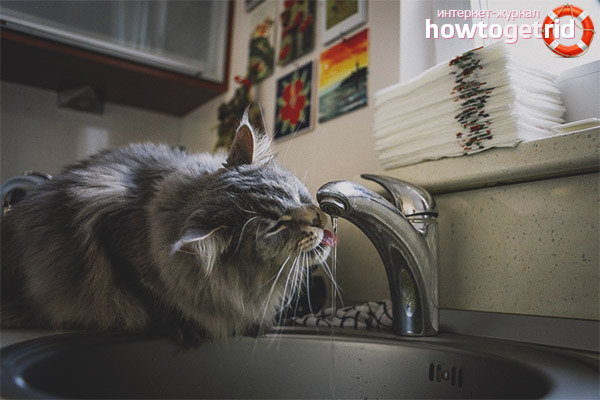
Domestic cats, like their wild counterparts, consume relatively little water, but you should always monitor its presence and freshness in a bowl. This is especially important if in the diet of the cat there are dry industrial feed. To purify water from excess salts of hardness and chlorine, any household filters are suitable. Drinking boiled water worsens the condition of the teeth due to the low content of carbonates and bicarbonates. Signs of lack of water occur in cats in the form of concentrated urine, the appearance of crystals in the discharge, which leads to the development of urolithiasis.
Diet for pregnant and lactating cats
After the onset of pregnancy, the cat's need for trace elements increases.During this period, it is necessary to provide it with a comprehensive and balanced diet, as this affects the health of the offspring. The cat “in position” needs to be fed with feeds recommended for kittens, giving immediately the amount calculated per day. After the weight of the cat is normalized, and the physical state is restored, you can gradually move to the food intended for her age.
During lactation, even more attention is required to the composition of the diet, as energy consumption increases at this stage. Calculating the daily dietary norms, you should consider the weight of the animal, age and number of kittens. Stimulate the production of milk to a greater extent canned feed, as they contain a greater percentage of water, and the components are more efficiently absorbed by the body. Adding additional vitamin formulations to feed is not recommended due to the risk of imbalance. During the feeding period of the offspring, the cat should always have plenty of clean water, as the body loses a lot of moisture from the excreted milk.
Approximate ration of cats from the beginning of life to one year
Kittens from 1 to 2 months: six-fold feeding. Reducing the consumption of cereals in cow's milk, the daily rate of food - up to 240 grams.
Kittens from 3 to 6 months: 4 feedings per day, the daily rate of meat - up to 40 grams.
Kittens from 6 to 9 months: during the period of active growth of all organs, muscles and skeleton, four meals a day are required, the daily amount of food is up to 250 grams.
Kittens from 10 to 12 months: two meals, daily intake up to 250 grams.
Mode feeding adult Maine Coons
Food adult cats should be two times. Daily intake rate - 180-200 grams. The rate can be reduced to 130 grams if the animal has problems with excess weight.
If the cat is kept on natural food, the approximate menu for the day may contain:
- 2-3 boiled egg yolks;
- half a teaspoon of ground sprouted wheat grains;
- cottage cheese, yogurt, kefir (with a fat content of not more than 3.5%);
- 100-130 grams of boiled beef
- 140-150 grams of chicken meat
- 100 grams of boiled lean pork;
- complexes of vitamins and minerals.
Or:
- 70-120 grams of protein in meat;
- 30-60 grams of kefir, yogurt, yogurt;
- up to 40 grams of boiled cereals;
- 20-40 grams of vegetables;
- yeast (at the tip of a teaspoon - as a source of B vitamins).
In general, to calculate the daily portion of feed in dry form, one can proceed from the recommended daily consumption of the following components (data are given for 100 grams of feed):
- Proteins - not less than 25, but not more than 40%;
- Fats - from 10 to 30%;
- Cellulose - 2-5%.
Video: Features of the maintenance and care of cats Maine Coon

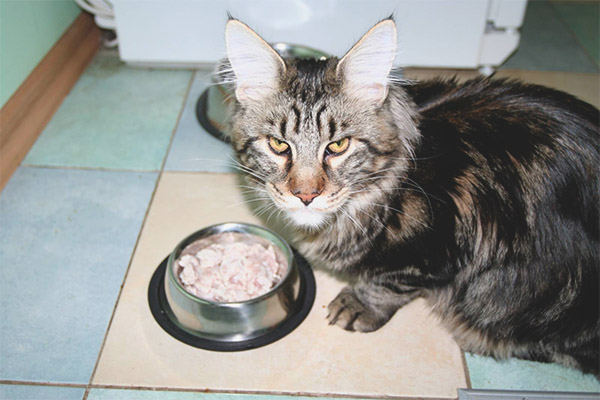
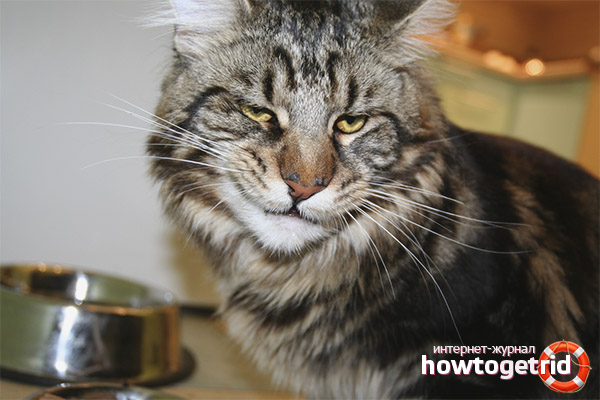

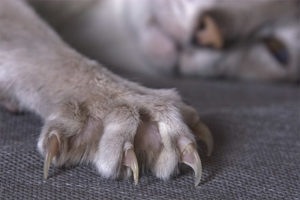
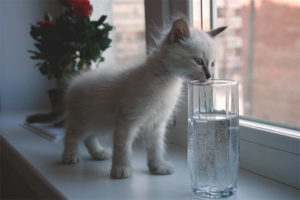
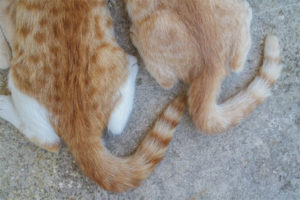
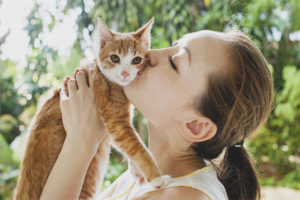
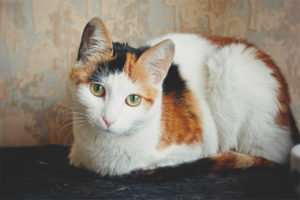
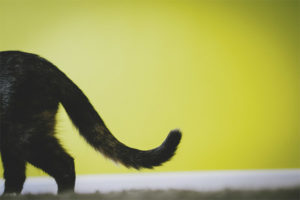
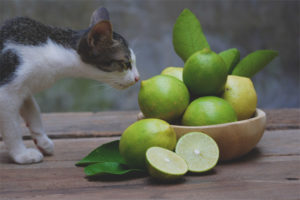
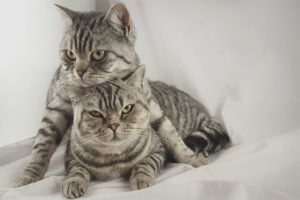
To send